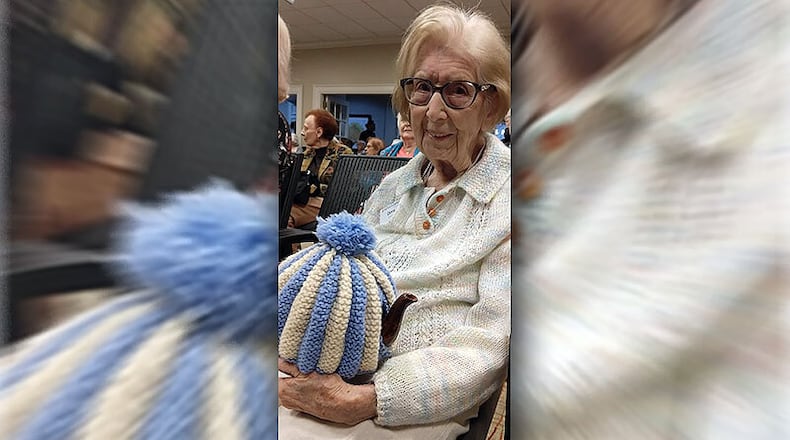Dora Sowell was born in 1918 during the Spanish flu pandemic. More than once, her mother worried that the sick, limp infant in her arms had died.
But baby Sowell would survive. She’d go on to marry, raise five children, manage a career as a nurse and, more than 100 years later, win another battle against another virus during another pandemic.
The Atlanta woman, who lives at Budd Terrace at Wesley Woods, an Emory Healthcare nursing home, tested positive and barely experienced any symptoms.
The staff celebrated Sowell’s swift recovery with posters and a round of cheers as she left a COVID-19 isolation wing and returned to her third-floor room filled with plants, family photos and knitting projects.
“She did extremely well,” said Dr. Elena Cabb, an Emory geriatrician. “And she was such a good sport about everything. Every time I saw her, she told me, ‘I survived Spanish flu, and I know I can beat this.’”
COVID-19 is generally hard on the elderly; those 65 and older account for 80% of the U.S. deaths from the disease, according to the Centers for Disease Control and Prevention.
It’s no surprise older people are more likely to get very sick because their immune systems tend to be weaker. But scientist and doctors don’t really know why some people get very sick from the coronavirus and others feel almost nothing.
MORE: Young trumpet player performs every day outside Emory Decatur Hospital
Cabb says good genes and luck likely played roles in helping Sowell overcome the virus so easily. An early screening also may have helped, she said.
Sowell’s daughter, Denise Johnson, said family members were “extremely anxious” during the 14-day quarantine period. But her mother, a native of Argentina, “took it in stride.”
“She has this stoic streak to her,” said Johnson, who lives in Brookhaven, “and, every day we called her, she told us, ‘I’m fine.”
It was back in late April that a few residents on the third floor at Budd Terrace tested positive for the coronavirus. So, health care workers tested all residents on the floor. Sowell was among those testing positive on April 20, which led to her being moved to a sixth-floor isolation wing for treatment.
“To have two positives, 100 years a part, was unbelievable,” Sowell said in a phone call. “I thought, I hope I can make it. I am a strong person, so I hope can make it.”
Sowell was 3-months-old when she was sickened with the Spanish flu. She grew up hearing tragic stories of those who died, including a young cousin.
For a few days after the positive coronavirus test result, Sowell felt fatigue and was slightly dehydrated. But, after IV fluids and close monitoring, she turned the corner, according to Cabb.
“She was feeling like herself again and eager to return to her room,” said Cabb.
Sowell, who is frail but mentally sharp, laughs when asked the secret to a long, healthy life. She pointed to three keys to her longevity: never eating too much, taking a nap in the afternoon and a small glass of sherry every night — the small glass of sherry being the most important one.
Family members, meanwhile, credit her longevity to far more than that. They say she had a life with purpose, an intellectual curiosity and maintained faith and optimism that she could overcome health challenges, even a pandemic.
At age 6, she taught herself to knit with two long fish bones and, over the years, took great joy in the craft and teaching it to others. In 1955, she became a naturalized U.S. citizen.
Sowell, who worked for many years at Moccasin Bend Mental Health Institute, a psychiatric hospital in Chattanooga, was a go-to person for family and friends seeking medical advice.
Her husband, Maurice Sowell, died in 1993. She lived independently at her home just north of Chattanooga until she was 100.
Realizing she needed more support and care, Sowell moved to the Renaissance on Peachtree in November in 2018 to be closer to her daughters in Atlanta. She moved into Budd Terrace about a year ago.
Budd Terrace has had 30 COVID-19 patients: 27 have recovered; two have died; and one is still in isolation recovering.
Nine employees also have tested positive for COVID-19 and have recovered. Budd Terrace is barring visitors for a while, screening employees and residents and has instituted temperature checks and monthly COVID-19 testing of residents.
Budd Terrace also has put a hold on community activities and communal dining. Cabb said staff is being creative as it works to provide activities and entertainment for residents — including using speakers on each floor to allow residents to play bingo in their rooms. And the activities director plays guitar at the doorways of the residents’ rooms. The staff has also helped Sowell connect with family members via Zoom.
While the visitor restrictions may be sensible, Sowell said she deeply misses seeing family members on a regular basis. And she looks forward to the day when she can once again see them in person.
About the Author
Keep Reading
The Latest
Featured










